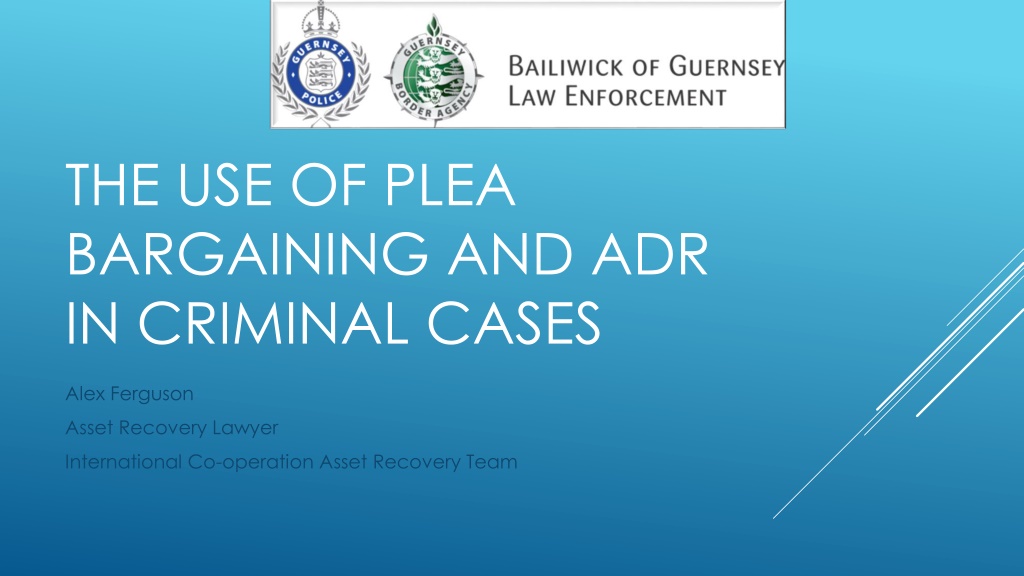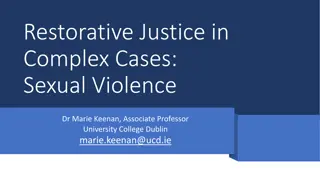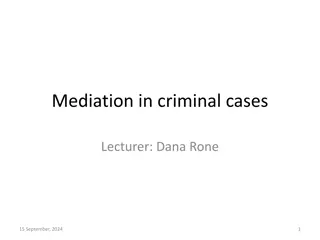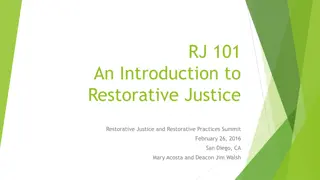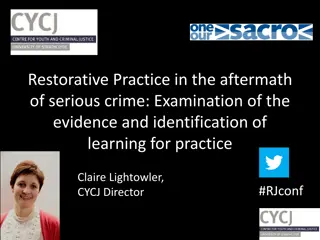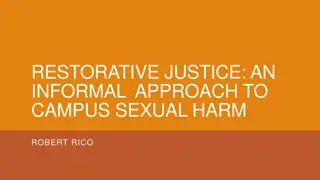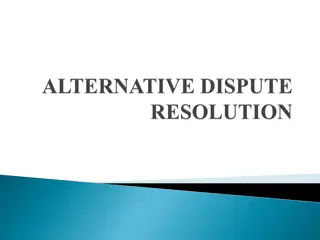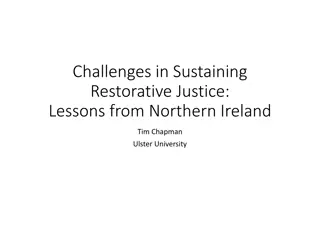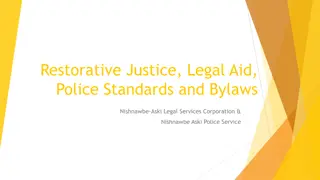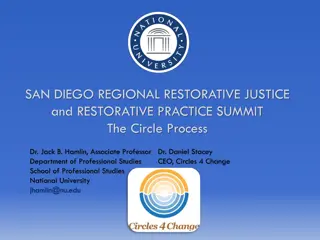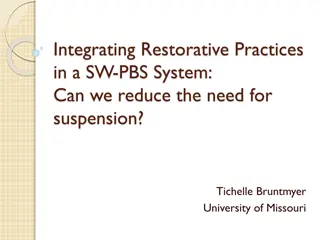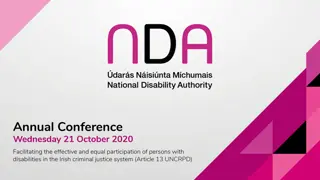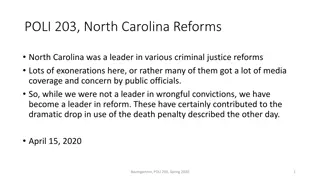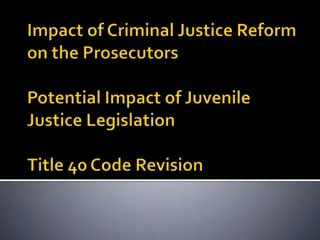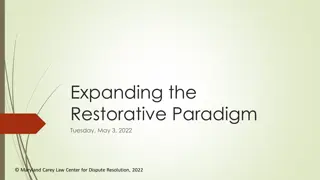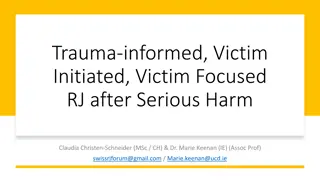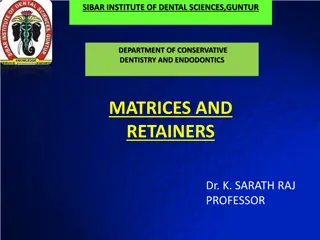Understanding ADR and Restorative Justice in Criminal Cases
Alternative Dispute Resolution (ADR) in Criminal Justice (CJ) involves resolving matters between offenders and the state, focusing on public policy goals like punishment and rehabilitation. Restorative Justice (RJ) is a related process where stakeholders collectively address the aftermath of an offense, promoting interactions between offenders, victims, and the community to achieve tailored solutions and provide answers and support to victims.
Uploaded on Sep 19, 2024 | 0 Views
Download Presentation

Please find below an Image/Link to download the presentation.
The content on the website is provided AS IS for your information and personal use only. It may not be sold, licensed, or shared on other websites without obtaining consent from the author. Download presentation by click this link. If you encounter any issues during the download, it is possible that the publisher has removed the file from their server.
E N D
Presentation Transcript
THE USE OF PLEA BARGAINING AND ADR IN CRIMINAL CASES Alex Ferguson Asset Recovery Lawyer International Co-operation Asset Recovery Team
OBJECTIVES: What is ADR? How does ADR work in practice? Deferred Prosecution Agreements; Plea Bargaining & Maximum Sentence Indicator
Alternative Dispute Resolution ADR To many ADR relates to the existence of a dispute between parties. In Criminal Justice (CJ) it is not usually viewed as a dispute between the victim and the offender, but is instead see as a matter concerning the relationship between the offender and the state. Can a criminal offence properly be described as a dispute?
Alternative Dispute Resolution ADR (continued) The goals of CJ also differ from ADR: ADR is often restricted to consideration of the interests of parties to the relative dispute; CJ involves consideration of a number of public policy goals such as punishment; deterrence; protection of the community; rehabilitation.
Alternative Dispute Resolution ADR (continued) ADR is not a term often used in CJ, instead it is closely related to Restorative Justice (RJ). What is RJ? A process whereby all parties with a stake in a particular offence come together to resolve collectively how to deal with the aftermath of the offence and its implications for the future
Alternative Dispute Resolution ADR (continued) RJ processes produce individually tailored solutions involving interaction between offenders, victims and the community. RJ can give victims answers to questions about why they have been victimised that information and support on their own cannot. Victims are more likely to receive an apology and for offenders it offers a unique opportunity to face up to what they have done and make up for the harm they have caused.
USING RJ IN THE CRIMINAL JUSTICE SYSTEM RJ can occur at any stage of the criminal process. It is most commonly used in relation to youth offenders: Referral Order Panels attendance at a panel to discuss the offence and the factors that may have contributed to the offending behaviour; Direct or indirect restorative justice victim and offender communicate with assistance of a trained facilitator; Community conferencing often used to resolve anti-social behaviour; Mediation the mediator assists the parties to reach an agreement
USING RJ IN THE CRIMINAL JUSTICE SYSTEM (CONTINUED) From the experience in the United Kingdom, in respect of adult offenders, RJ is most commonly used in relation to conditional cautions. Courts can also utilise RJ. They are able to defer sentence post conviction to allow for RJ activity to take place by imposing an RJ requirement. Alternatively the court might adjourn sentence to allow for RJ activity to take place
DEFERRED PROSECUTION AGREEMENTS (DPA) DPAs were first introduced in the United Kingdom on 24th February 2014 under the provisions of Schedule 17 of the Crime and Courts Act 2013. They are available to the Crown Prosecution Service (CPS) and the Serious Fraud Office (SFO). A DPA is reached between a prosecutor and an organisation which could be prosecuted, under the supervision of a Judge. The agreement allows for the prosecution to be suspended for a defined period. DPAs can be used for fraud, bribery and other economic crime.
DPAS, KEY FEATURES They apply to organisations and not individuals; They enable a corporate body to make full reparation for criminal behaviour without the collateral damage of a conviction e.g. sanctions or reputational damage; They are concluded under the supervision of a Judge, who must be convinced that the DPA is in the interests of justice; They avoid lengthy costly trials and they are transparent public events
HOW DO DPAS WORK? A prosecutor charges a company with an offence but proceedings are automatically suspended if the DPA is approved by the Judge; A company would only be invited to enter into DPA negotiations if there were full co-operation with the investigation; If negotiations go ahead, the company agrees to a number of terms, such as paying a financial penalty, paying compensation and co-operating with future prosecutions of individuals; If the company does not honour the the conditions then the prosecution may resume.
CURRENT DPAS Standard Bank 2015; Sarclad Ltd 2016; Rolls Royce 2017; Tesco 2017; Serco Geografix Ltd 2018. Total financial penalties (including compensation and costs) 690,495,000
THE MAXIMUM SENTENCING INDICATION (MSI) Goodyear v R EWCA Crim 888 The defendant complained that he had pleaded guilty to a charge of corruption on the basis of an indication from the judge that he would not receive a custodial sentence. Having pleaded guilty he had then been sentenced to a six months prison sentence suspended for two years. The Court of Appeal in Goodyear found that where a defendant requested an indication from a Judge, and had been appropriately advised, a Judge might give an indication. The court set out in detail the pre-conditions for giving an indication. Among them were that the facts should have been agreed, the defendant should initiate the request, and he should be told of the limitations of the request, including the fact that it may not be binding so as to prevent a reference of the sentence by the prosecution as unduly lenient. As to the effect of the indication: Once an indication has been given, it is binding and remains binding on the Judge who has given it, and it also binds any other Judge who becomes responsible for the case. In principle, the Judge who has given an indication should, where possible, deal with the case immediately, and if that is not possible, any subsequent hearings should be listed before him. This cannot always apply.
THE MAXIMUM SENTENCING INDICATION (MSI) It was recognised that a new judge has his own sentencing responsibilities, but judicial comity as well as the expectation aroused in a defendant that he will not receive a sentence in excess of whatever the first judge indicated, requires that a later sentencing judge should not exceed the earlier indication. If, after a reasonable opportunity to consider his position in the light of the indication, the defendant does not plead guilty, the indication will cease to have effect. An indication should not be sought on a basis of hypothetical facts. The factual basis on which the plea is made should be agreed between the prosecution and the defence. In the case of Goodyear, the Judge should have abided by his indication.
WHAT IS AN MSI HEARING? A MSI allows the Defence to request an indication of the likely maximum sentence should the defendant plead guilty. MSIs allow defendants to hear what the maximum would be should they enter a guilty plea. A MSI must be sought on the basis of the actual facts of the case, not hypothetical facts. Any issues between the Prosecution and Defence must be resolved before the Judge/Magistrate accede to a request for an indication. What if facts cannot be agreed on?
WHAT IS AN MSI HEARING? A sentence indication may relate to: A sentence of a particular type; A sentence of a particular quantum; A sentence that would not be imposed; or A combination of sentences.
WHAT IS AN MSI HEARING? A MSI should only be given if an accused to an offence alleged in a charge or any other specified offence makes an application for an indication. The Judicial Officer should be sure that the Accused understands that a MSI should only be requested when guilty of a crime and NOT because one is tired of being incarcerated or as a tactical strategy. Further, what happens in a MSI stays in a MSI. It cannot be referred to if there is a subsequent trial.
